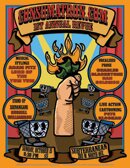Ben & Jerry's Oatmeal Cookie Chunk Ice Cream (1 pt.)
Item Purchased: Ben & Jerry's Oatmeal Cookie Chunk Ice Cream (1 pt.)
Location Purchased: Jewel / 1224 S. Wabash Ave. / Chicago, IL
Price: $3.50 + tax
Review: I have reviewed different flavors from the Ben & Jerry's arsenal before. In that review, I praised the company's ethics when it comes to charity and seeking out natural ingredients. Though I still stand by that review and applaud Ben & Jerry for their efforts, it was by some strange coincidence that, while I was eating this latest flavor of Ice Cream, I was also reading a passage from Douglas Rushkoff's new book, Get Back In The Box. In this passage, Rushkoff questions whether the ethical commitment of a company is all that meaninful when the company itself sells something that aids in the increasing obesity of the general public such as ice cream. Oddly enough I was reading this passage as I was shoveling the frozen oatmeal tastiness into my eager gullet.
I felt a bit guilty.
Still, if I am going to make my own dietary decision to pig out, at the very least, I can buy the object of my swinehood from a company that at least tries to have its head in the right place.
The oatmeal cookie chunk flavored ice cream is one of the most interesting B&J flavors I have ever tried. First off, the ice cream itself is flavored with cinnamon, which would have been enough for me. Second, there are frozen fudge chunks scattered throughout. Last but not least, there are huge gooey lumps of actual oatmeal cookie dough which not only add more cinnamon to the mix, but also give the ice cream a chewey texture that you will be hard pressed to find in any other frozen dairy treat (unless you buy some past due push pops from your local convenience store). The experience of eating this ice cream reminds me of eating regular oatmeal with frozen vanilla yogurt plopped on top. Maybe not ethical at the core, Ben & Jerry's are still a company I get behind and I urge you to try this out-of-the-ordinary flavor and feel that tasty guilt like a lump in your stomach.
Rating: 4.5 / 5
Location Purchased: Jewel / 1224 S. Wabash Ave. / Chicago, IL
Price: $3.50 + tax
Review: I have reviewed different flavors from the Ben & Jerry's arsenal before. In that review, I praised the company's ethics when it comes to charity and seeking out natural ingredients. Though I still stand by that review and applaud Ben & Jerry for their efforts, it was by some strange coincidence that, while I was eating this latest flavor of Ice Cream, I was also reading a passage from Douglas Rushkoff's new book, Get Back In The Box. In this passage, Rushkoff questions whether the ethical commitment of a company is all that meaninful when the company itself sells something that aids in the increasing obesity of the general public such as ice cream. Oddly enough I was reading this passage as I was shoveling the frozen oatmeal tastiness into my eager gullet.
I felt a bit guilty.
Still, if I am going to make my own dietary decision to pig out, at the very least, I can buy the object of my swinehood from a company that at least tries to have its head in the right place.
The oatmeal cookie chunk flavored ice cream is one of the most interesting B&J flavors I have ever tried. First off, the ice cream itself is flavored with cinnamon, which would have been enough for me. Second, there are frozen fudge chunks scattered throughout. Last but not least, there are huge gooey lumps of actual oatmeal cookie dough which not only add more cinnamon to the mix, but also give the ice cream a chewey texture that you will be hard pressed to find in any other frozen dairy treat (unless you buy some past due push pops from your local convenience store). The experience of eating this ice cream reminds me of eating regular oatmeal with frozen vanilla yogurt plopped on top. Maybe not ethical at the core, Ben & Jerry's are still a company I get behind and I urge you to try this out-of-the-ordinary flavor and feel that tasty guilt like a lump in your stomach.
Rating: 4.5 / 5











4 Comments:
Ah, yes, we should stigmatize companies that do no harm just because they are making a product that is less that perfectly good for you. I don't even like ice cream and I do like Rushkoff, but that is joyslaying idea of I ever heard of it. Ice cream has been around a lot longer than the obesity epidemic (which is, by the way, about as high end of problem as a country is likely to have) and hopefully will be around long after we have figured out how to live more moderate, healthy lives.
I don't know if stigmatizing B&J was Rushkoff's direct intention. I doubt I will stop buying B&J or organize a campaign against them, but it was an angle that I had never thought about before. B&J do use their social consciousness as an advertising point quite a bit...almost moreso than the deliciousness of their product. While Ice Cream is not a social ill in itself (it is of course, the consumer's choice and willpower that is the ultimate key to preventing obesity), the point is valid in that it lays bare our priorities. If I buy B&J Ice Cream, I am spending my money responsibly, but to what degree am I helping to protect an environment if I am killing myself within it?
Methinks the absurdity of the contradiction is used more to draw attention to corporate responsibility and innovation, which is what the book is primarily about. I love Ice Cream and even moreso if the company that produces it is a responsible one, but to advertise social responsibility as a key point of a product that is almost entirely bad for the people within (and a part of) the environment seems to be nothing more than an economic and health stasis.
The most interesting point made by Rushkoff, to me, is the fact that B&J were bought out by Unilever. Something I had never heard before. How much of their social directive has been compromised by Unilever and is B&J trying to infect their parent company as Rushkoff suggests. These are more interesting questions to me than whether or not Rushkoff is simply joyslaying for the sake of joyslaying or for his own benefit.
It's really hard for people to read my little passage, because most people are trapped in the consumer mindset. The piece doesn't have anything to do with consumption.
What I was looking at was how to create a model for a company that really does good - and whether that doing good can be directly through the product or service, itself. But the whole thing is from the company's point of view. People can buy whatever product they want, and stigmatize or not stigmatize anyone or anything.
Ben and Jerry's was a great try. Their biggest mistake was going public, which allowed their shareholders to force the sale to Unilever, which kind of defeated the whole point.
But my main original thought was to ask whether making ice cream (not buying or eating it; I'm not concerned with that part right now) - whether making ice cream is the very best choice of job for someone who has decided to dedicate his life to making the world a better place.
I only speak for myself here, but it is a hard thing for me to read this passage (or your book for that matter) outside of the consumer mindset. However, as a consumer, the question of whether making ice cream is the very best choice of job for someone who has dedicated his life to making the world a better place is at the forefront of my mind.
As I said, most of the press that B&J gets, is about their dedication to social and environmental issues and as a consumer who cares about these sort of things, that matters. However I never stopped to think about the fact that they are selling toothrot to make the world a better place.
As I think about this more, the most interesting part about this is that they couldn't survive (in the increase-profits-every-year sense of the word) without selling to Unilever. Is this a magnification of the old token charity donation that every large business is expected to give. The way that oil companies give to environmental organizations? Perhaps selling crap to people to do good isn't a sustainable business model. It takes more than charity to change the world if the charity is simply a topping on the vein-clogging cake.
Post a Comment
<< Home